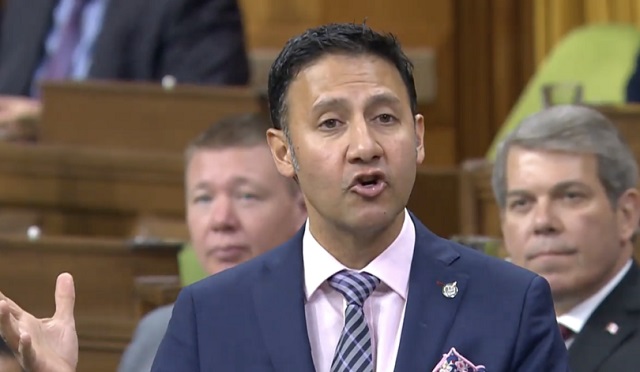From The Center Square
“I turned around and somebody pulled him back and he kicked me in the face. I pulled out pepper spray and I nailed him in the face, and then I retreated and called 911 and then the police never showed up.” Higby said he waited for police for about 45 minutes but they never came.
Seattle Police are investigating an attack on an independent conservative journalist last weekend during anti-Trump and anti-ICE rallies in Seattle.
Cam Higby says he was assaulted by Antifa members as he attended the sometimes violent “No Kings Day” protests in Seattle at a Department of Homeland Security Building (DHS) on June 14.
Separately, independent journalist Brandi Kruse says she also was assaulted by Antifa members in Tukwila, just south of Seattle. Both attacks were captured on video posted to social media.
“It was out of nowhere, completely out of nowhere that they got violent,” said Higby, whose attack was captured on vide and posted to X. The attack left him bloodied, bruised and with a concussion that is still causing headaches, vision impairment and memory issues nearly a week later, he said.
BREAKING: I have identified the Antifa militant who assaulted @camhigby in Seattle.
Jeremy Calvin Lawson, 33, of Monroe, Washington.
Lawson uses the alias “Jack Rack” and has a history of involvement with Antifa, including Antifa affiliated tattoos. https://t.co/wx2CFzO4ZV pic.twitter.com/q928sUnlL4
— Katie Daviscourt 📸 (@KatieDaviscourt) June 16, 2025
In a Friday interview, Higby told The Center Square he had been covering the protests in Seattle all day and took a seat on the ground near the federal building by himself when the assailants came out of nowhere.
“They took over the streets, they lit fires to cars, they shot fireworks at cars. Then it’s out of nowhere where this guy yells, ‘Hey Cam, it’s time for you to leave,’ and they charged me and I knew one of them and I’d identified him earlier in the night because he threatened to kill me three weeks earlier,” Higby. told The Center Square
The attacker he was referring threatened to kill Higby in an Instagram post, he said, which was reported to police.
“They crossed the street to get to me and charged me and before I could stand up, I was pinned up against the wall,” said Higby. “They were grabbing at my gas mask and my helmet and just keeping me in place and one of them picked me up and choked me out from the rear. And then he released me, punched me twice in the head with SAP gloves which were filled with steal or lead shot. I turned around and somebody pulled him back and he kicked me in the face. I pulled out pepper spray and I nailed him in the face, and then I retreated and called 911 and then the police never showed up.”
Higby said he waited for police for about 45 minutes but they never came.
Video journalist Jonathan Cho, who was also covering protests, picked him up and took him back to his car across town, Highboy said.
Higby said he went to urgent care the next morning and then to the emergency room when his symptoms related to the concussion were getting worse.
“They said if I had a brain bleed, I’d already be dead. I think it’s very likely that if I wasn’t wearing a helmet, that I would have been either killed or critical,” Higby said.
Kruse, host of the unDivided video podcast, told The Center Square she had only been at the Tukwila protest scene for 30 seconds when she was attacked.
“I didn’t even get a chance to cover it. Within 30 seconds of walking up, I heard a couple of people shout, ‘that’s Brandi Kruse.’ And then they started to form around me, and initially it was they were blocking my camera with their umbrellas because they don’t want you to document their criminal conduct. And then they started spraying water at me, and then they got a little more aggressive,” Kruse said. “They were dumping full bottles of water and hurling bottles of water and it hit me a couple of times from behind.”
Kruse said she tried to walk away but was followed with protesters pushing signs into her face and continuing to hurl things at her.
“But the thing is they won’t let you walk away, and they don’t want you to walk away. I’m just sort of looking over my shoulder and then I see this individual coming from behind me to the right who had something that they were starting to spray. And you know, your mind goes in a million different places, and you don’t know what it could be, but as soon as it hit my eyes and I got the smell, I knew it was some sort of bug spray because it had that distinctive smell. We found out later it was this hornet and wasp killer that can spray like up to 20 feet,” said Kruse, who posted to social media video of the attack and security escort pouring water into her eyes to flush out the spray which she shared burned painfully for days.
In the assault on Higby, police say they know who the assailant is but have yet to make an arrest. Higby said he’s “10 thousand percent sure” it’s the same person who threatened him weeks before.
Higby told The Center Square he’s been informed that despite the seriousness of the assault, prosecutors may not be inclined to pursue charges.
Seattle Police responded to an email from The Center Square on Friday requesting details on the case and received the following response: “This case is an open and active investigation assigned to SPD’s homicide & Assault Unit. SPD policy prevents me from releasing suspect details or ‘leads,’” wrote Eric Munoz, detective in SPD media and public affairs.
Seattle Police Guild President Mike Solantold The Center Square in a Friday interview that he was skeptical as to whether prosecutors would pursue charges, despite the serious nature of the attack on Higby. He also condemned the lack of coverage in the mainstream media of the assaults on journalists.
“I think the bigger conversation here is why isn’t corporate media drawing attention to this political violence as they’re watching journalists get assaulted and it doesn’t appear to be covered by corporate media at all. My question is why, and the fact that that’s not happening is a major problem with what’s unfolding in our nation,” said Solan.
Kruse said she was also disappointed that members of the mainstream media have ignored the attack.
“I was getting text messages from former colleagues in television news in Seattle asking if I was OK, saying they saw the video, but then never reporting on it. So it’s not as if they’re oblivious…..if these were the proud boys, or if these were right-wing extremists and they assaulted journalists, there’s no way that it wouldn’t be covered,” said Kruse.
Kruse said she’s been in contact with officials in the Trump administration who are paying attention to the case, but has also filed a police report with Tukwila PD.

















